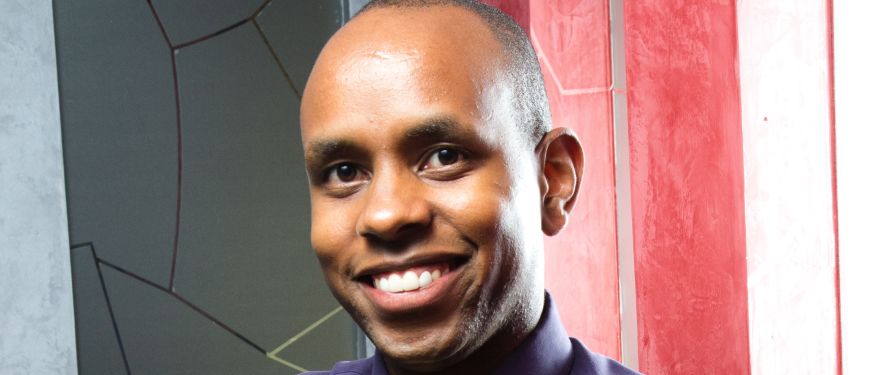About the Global Opportunity Fellowship (GO:Africa)
HBS offers a variety of career support and exploration programs for eligible students that provide financial assistance for those who choose careers in which starting salaries are lower than those of typical MBA graduates. The Global Opportunity Fellowship (GO:Africa) provides supplemental income to HBS MBA alumni who have received job offers in Africa, starting with the class of 2018. In this pilot program, students will receive up to $50,000 in compensation each year for up to five years (with a maximum award of $150,000). This award is intended to support students who want to make an impact specifically in Africa.
About Karibu
HBS alum, Karibu Nyaggah, graduated from Harvard Business School in the class of 2010. Born in Kenya, but living in the United States, Karibu had not worked or lived in Africa since leaving as a child. Karibu returned to Kenya for his summer MBA internship and then again after graduating to continue his career.
We sat down with Karibu to discuss his experience with the changing landscape in Africa, the growing economy, and the impact that the GO:Africa Fellowship can have.
For MBA students who want to make a difference in the world, Africa is a great starting point.
I had not worked or lived in Kenya since leaving as a child until my summer MBA internship. That experience opened my eyes to a life I had not been a part of since childhood but now knew would form an important part of my future. I worked at Kenya Commercial Bank, one of the largest banks in the country, touring different divisions within the bank. There, I got to see and understand what corporate life was like and compare it with my previous experience working at PricewaterhouseCoopers in San Francisco.
One day, we visited a manufacturing client with a senior corporate relationship manager. We drove through a dusty, potholed two-lane road and it took us the better part of the afternoon to make the visit in the hot sun, passing many street merchants along the way who wanted to sell us their wares – everything from phone chargers to sunglasses. After spending some time understanding our clients’ needs, we promised to get back to him on the possibility of extending his line of credit at the bank. This was Africa – a stark contrast between street hustlers who were living day to day and medium-sized business owners who were in the middle of their own hustle, each trying to get money to build themselves up.
The opportunity to make a meaningful impact is incredibly wide and diverse.
It’s often been said that Africa is today where China was at the turn of the century. Africa is growing in leaps and bounds, making important strides economically, politically, and socially. By the year 2020, McKinsey Global Institute estimates that Africa’s GDP will reach $2.6 trillion and by 2040, over 1.1 billion Africans will be of working age! This economic progress is tangible in Nairobi. Since I moved here, Kenya achieved internet speeds that are higher than some developed countries, developed one of the hottest real estate markets in the world, and cultivated one of Africa’s foremost innovation hubs. And yet, there is so much more that remains to be done. Across most sectors, whether in health care, business, government, or social work, there are diverse opportunities to make a meaningful impact. For MBA students who want to make a difference in the world, Africa is a great starting point.
A GO Fellowship would have helped me take greater risks.
After graduating HBS, I spent a year doing an HBS Leadership Fellowship before moving to Kenya where I have lived and worked for almost eight years. During this time I worked in both the social and private sectors. I also did consulting for the World Bank, giving me great insight into working with African governments. Africa is filled with exciting potential alongside its share of challenges and I can unequivocally say that the GO Fellowship is an opportunity I would have embraced with open arms. Many MBA students will find that their impact has a disproportionately larger effect working in emerging markets because the scope of opportunity is just that much bigger. Yet a key barrier for many students might be the financial aspect. Most companies in Africa simply do not have the resources to compensate graduates in the same way as their western counterparts. The GO Fellowship bridges this gap by helping address a key consideration for anyone seeking to work on the continent. A GO Fellowship would have helped me take greater risks – perhaps allowing me to explore a professional opportunity at a corporate company that I might have turned down.
A dusty two-lane road turned into a flagship superhighway.
Today, almost 10 years after my internship, that dusty, potholed two-lane road is now a flagship 8-lane superhighway. I download movies on iTunes faster than I do from my parents’ house in California. Burger King, KFC, and Subway are all here. From Nairobi, I can easily travel to Europe, Asia, or North America. I can just as easily take a safari, go to the beach, or visit incredible cultural destinations within Africa such as Zanzibar. In other words, living and working in Kenya is not only a fantastic professional opportunity, but also filled with a great quality of life. The fact that the GO Fellowship enables this incredibly rich experience speaks to the importance that HBS places on ensuring that MBA students have the best possible career opportunities after graduation. For students who find a compelling career opportunity in the continent, or who may not have previously considered Africa as part of their career search, I strongly encourage them to consider Africa as a post-graduation option, particularly with the safety net provided by the GO Fellowship.

